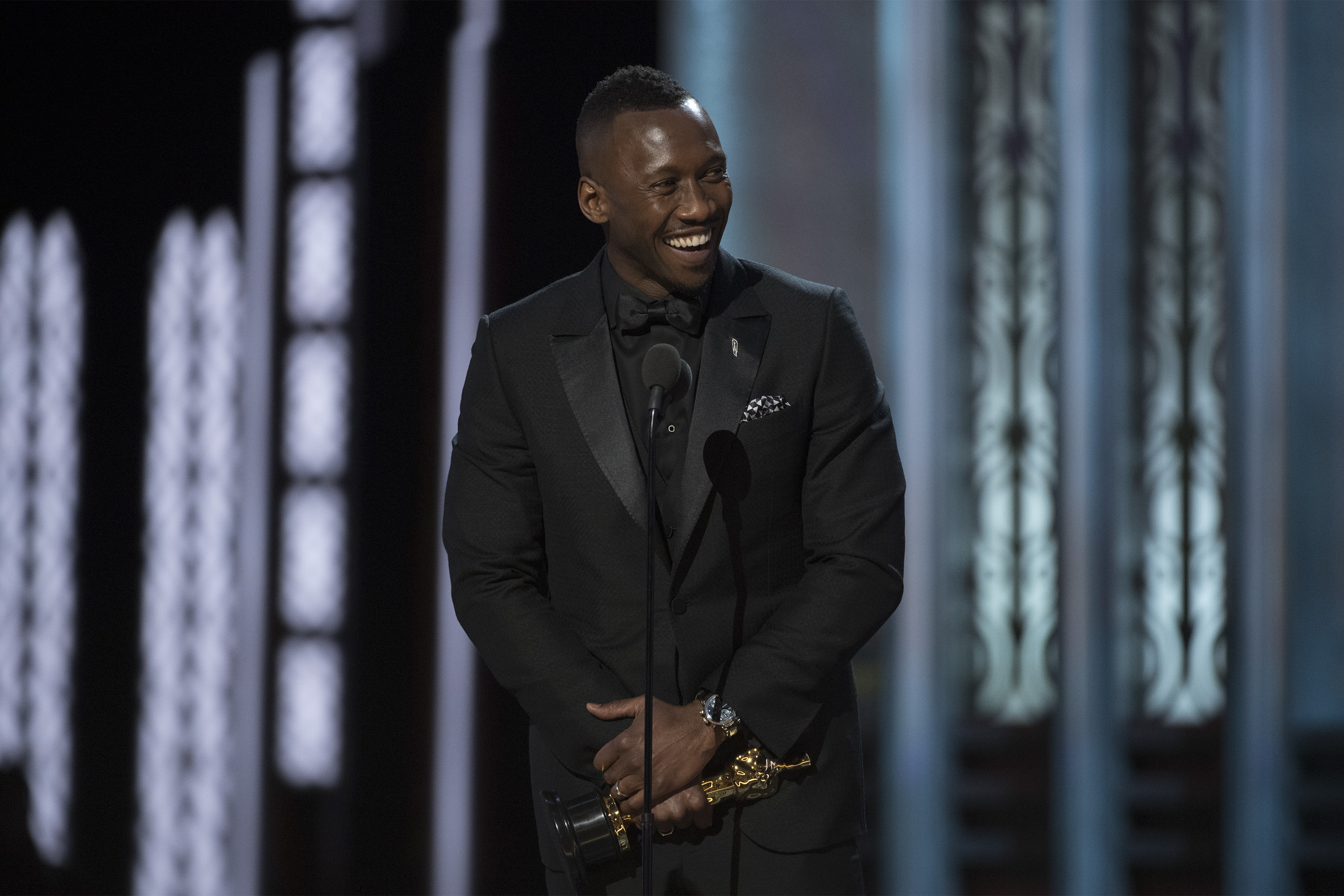The underdog Best Picture triumph at the 2017 Oscars of Barry Jenkins’s deeply affecting Moonlight, which already feels like a contemporary classic, over the lightweight, plucky, Hollywood fantasia La La Land, might be seen as a weather vane of sorts, an upbeat sign of the impact of the Black Lives Matter movement and the genuine strides the LGBT community made under Obama.
Sublime and sobering, Jenkins’s winning work, energized by James Lax’s restless, expressive cinematography, is one of the most clear-eyed testimonies ever filmed of the psychic cost of growing up gay or “different” in an inimical environment. Moonlight has an artful, satisfying three-part structure that reveals what Richard Linklater’s Boyhood, with its wondrous, 12-year shooting period, also allowed audiences to ponder: As we age, we can appear, physically, like dramatically distinct people. In Jenkins’s brave film, which deftly portrays its gay black protagonist, Chiron, in childhood, adolescence, and adulthood, we might be viewing three incarnations in one.
Moonlight concentrates, with complete savvy, on bedeviled Chiron and never strays from Miami’s sidelined black community. In the vivid first section, the young Chiron (nicknamed “Little”) is taken up (in an intuitive, offhand way) by a Miami man who’s a drug dealer but an avuncular, even tender one, who truly values and aims to protect the picked-on, fatherless boy. Mahershala Ali’s mindful, Oscar-winning performance as Little’s godsend of a mentor is at the emotional core of this complex movie. The big brother–dealer takes his skittish charge to the beach and the image of the grown-up ally supporting the trusting Little as he floats has a biblical aura of benevolence and baptism, a rapturous quality that resonates throughout the rest of the picture. It’s part of Moonlight’s power that Chiron’s story, his survivor’s buoyancy, is conveyed through incidents of hard-won calm, like oases—through flashes of luminous natural imagery and profound color.
We watch as a callow Chiron struggles to grasp his possible gayness, and only the fostering dealer and his girlfriend, Teresa (played by pop singer Janelle Monáe, in an unforced, appealing debut), supply a positive mirror when the harassed boy asks, in heartbreaking fashion, “What’s a faggot?” The two allies’ support is 180 degrees from the dismissive response of Chiron’s crack-addled mother, Paula, played with requisite ferocity (and theatrical empathy) by British actress Naomie Harris, in such a way that she seems not a freebasing harpy but a flailing, stitched-together woman, barely able to contend with herself, much less handle a belittled, “punk-ass” son. Of course, it’s not lost on us that Chiron’s mentor, Juan, is also his junkie mother’s supplier.
The film’s most galvanizing scenes center on a watchful, hangdog, adolescent Chiron (played fiercely, movingly by Ashton Sanders), who’s lucid about his “punk” status and full of yearning—caught in bullying scenarios at his high school that push the pestered teen to violence.
Chiron Three (aka “Black”), a cool, muscled dealer (like his boyhood mentor), prone to trouble, visits his remorseful mother in rehab, and she begs his forgiveness, pleading with him not to throw away his life. Black also finds time for a poignant reunion with his first crush and longtime homeboy, Kevin, who once initiated him sexually, then brutally betrayed him, in predictably spun-around teenage fashion. As the two ex-cons catch up, after a decade apart, there’s a sad, staggering disclosure from Chiron, and it’s a testament to Trevante Rhodes’s subtle performance that both the tagalong child and the seething teen are detectable under the grown-up Chiron’s stoic mask and gym-honed body. Played by the marvelous André Holland, with casual sexiness, irreverence, and curiosity (“Who is you, Chiron?”), the adult Kevin, a “shoe-money” chef, imbues the film’s final chapter with an unanticipated ray of redemption and romantic possibility so inherent in the potent lunar spell (“In moonlight, black boys look blue”) of the film’s title.
***
Even before we absorb Moonlight’s first image, on the soundtrack we hear, with breathtaking audacity and irony, the song “Every Nigger Is a Star.” Mainstream films often fixate on famous black strivers and historical giants, slighting ordinary African-Americans—a needling fact that Viola Davis addressed in her rousing Oscar acceptance speech for her sterling supporting performance in Fences, with an eloquence rarely encountered on the awards circuit. The daughter of a man who never attended high school, Davis expressed gratitude at the chance to portray an unpretentious Pittsburgh housewife of the still-segregated 1940s and ’50s, a role rendered with meticulous dramatic precision by the great master-builder playwright, August Wilson. Blessedly sane, vibrant, and articulate, both on and off-screen, Viola Davis has been an audience favorite since her bravura scene in Doubt, in which her distraught character implied that her son might be better off under the aegis of a possibly pedophile white priest than pummeled by his homophobic father—a predicament deeply linked to the bullying world of Moonlight.
In this dynamic film version of Wilson’s Pulitzer Prize–winning play, Davis and Denzel Washington reach deep down and deliver emotional pyrotechnics that illuminate two strategies of black survival: one stoic, cautious, long-suffering, and rooted in the black church; the other defiant, exasperated, storming the battlements of pre–Civil Rights America. Washington’s Troy Maxon (a pitcher whose career was shunted by Jim Crow), is perhaps the greatest of all his roles—Jovian, full of unbridled fury—the one closest to being Shakespearian. Some detractors have deemed Fences “too stagey” and “over the top,” but these charges seem wrongheaded: Who complains about the staginess of the filmed version of A Streetcar Named Desire? We have Vivien Leigh’s legendary Blanche and Marlon Brando’s iconic Stanley—along with Tennessee Williams’s indelible lines—as dramatic gospel.
Likewise, the powerhouse Fences (directed by Washington himself) is an able match of great material and impassioned actors at the height of their powers. I felt I was witnessing scenes from my own childhood, my own clashes with my military father, a pioneer who helped to desegregate West Point. Fences pays tribute to these unsung African-American warriors whose tough-minded diligence and perseverance were meant to propel them past racist obstacles—and their subsequent tragic failure to overcome society’s constraints. As my cousin Annis put it, “Denzel had the Cassells men down to a T!” What more can you ask from a film than to have your own life and family illuminated?
***
Having boned up on horror-film mechanics, Emmy-winning TV comic and first-time director Jordan Peele, who has already garnered a slew of awards for his debut, has extended his satirical, sketch-comedy chops (his genius for portraying a whole gallery of African-American types—from superintellectuals to the scrappy numbers runner on the corner) to the big screen. Akin to Malcolm Lee’s brilliant, very funny Undercover Brother, Get Out is a movie that evokes Hitchcock, Edgar Allan Poe, specters of Frankenstein and Stepin Fetchit, and yes, The Stepford Wives, and takes black paranoia to inventive new movie realms, suggesting both freewheeling sci-fi and crackpot conspiracy theory.
A reluctant young black man (a brilliant Daniel Kaluuya) accompanies his cuddly white girlfriend to meet her allegedly liberal family in some elite bastion beyond the city, and the stray black citizens who appear have such a stilted, submissive air that it’s clear things are not at all what they seem in Caucasian Land. In contrast to Spike Lee’s Jungle Fever, which was cluttered with scenes designed to humiliate or rail against the film’s attractive interracial couple, Get Out indulges in gleeful skepticism about the dilemmas of interracial dating and partnership without ever being a downer. It’s hard to discuss the movie’s sleight of hand without revealing its hairpin turns and diabolical torques, but let’s say some of the wickeder scenarios involve “a sunken room,” sinister science, and a woman trolling the NAACP website for new meat. When Get Out’s jack-in-the box secrets and funhouse structure are fully revealed, the film practically demands a second viewing to savor the shape-shifting actors’ acrobatic feats. In the closing reel, Peele rigs a tense setup (reminiscent of recent incidents of rogue cop brutality caught on dash-cam) with just enough sting to make the on-edge audience gasp, then somersaults the film into a hilarious brand of African-American “I told you so.”
In an America rocked by a resurgence of undisguised white supremacy, by the benighted alt-right marchers of Charlottesville, Get Out, an exhilarating mix of movie horror and racial critique that riffs on themes of bigotry, usury, and micro-aggression, comes as brain-twisting, irreverent relief.
Cyrus Cassells, a poet and professor of English at Texas State University, lives in Austin.





0 Comments